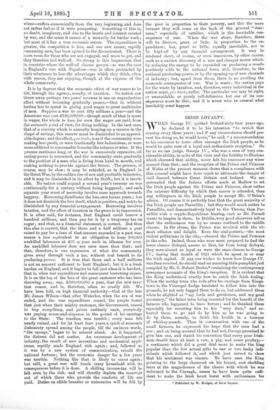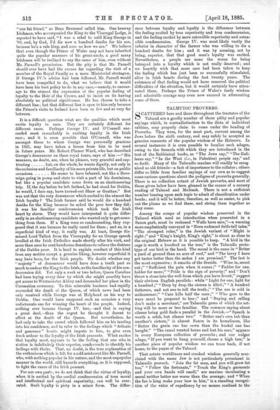IRISH LOYALTY.
WHEN George IV. quitted Ireland *sixty-four years ago, he declared it to be his intention " to revisit that country every three years ; and if any circumstance should prevent his doing so, ho would leave," he said, " a recommendation to his successor to come often amongst the Irish people, as he would be quite sure of a loyal and enthusiastic reception." So far as we can judge, George IV., who was a man of very considerable ability, in spite of the vices and the liability to illusions which obscured that ability, never left his successor any wiser counsel than that ; and the reception of the Prince and Princess of Wales at the present moment shows that a compliance with this counsel might have done much to attenuate the danger of civil discord between Great Britain and Ireland. We are persuaded that the furious efforts made at Mallow to set the Irish people against the Prince and Princess, show rather the extreme difficulty by which that course is attended, than any willingness in the Irish people to accept Mr. O'Brien's advice. Of course it is perfectly true that the great majority of the Irish people are Parnellite ; but they would much rather be Parnellite, and demonstratively loyal to the Throne, than Parnellite with a crypto-Republican leaning, such as Mr. Parnell wants to inspire in them. In Dublin, very good observers tell us that the enthusiasm was by no means confined to the middle classes. In the slums, the Prince was received with the utmost effusion and delight. Even the coal-porters,—the most violent politicians in the city,—cheered the Prince and Princess to the echo. Indeed, those who were most prepared to find the lower classes disloyal, assure us that, far from being disloyal, they were almost as loyal as were the same classes to George IV., during that month of 1821 which he spent in or near the Irish capital. If any one wishes to know how George IV. was then received, he should read an amusing little pamphlet just compiled by Mr. S. Hubert Burke,* containing the contemporary newspaper accounts of the King's reception. It is evident that the King understood exactly how to catch the Irish feel;ng. When the motley train who rode after his carriage from Kingstown to the Viceregal Lodge hesitated to follow him into the grounds, he not only begged them to do so, but addressed them when he alighted as " my lords and gentlemen, and my good yeomanry," the latter term being invented for the benefit of the farmers who happened to have horses ; and he thanked them especially for escorting him to his "very door," and exhorted them to go and do by him as he was going to do by them, namely, to drink his health in a bumper of whiskey-punch. Then in conversation with one of the small farmers, he expressed his hope that the man bad a caw ; and on being assured that he had not, George promised to give him one, and stated his conviction that every poor Irishman should have at least a cow, a pig, and some poultry,— a sentiment which did a great dial more to make the king popular than the few actual gifts to one or two lucky individuals which followed it, and which just served to show that his sentiment was sincere. To have seen the King pointing to the large shamrock on his breast, and shedding tears at the magnificence of the cheers with which he was welcomed to the Cnrragh, seems to have been quite sufficient to make the Irish heart burst with enthusiasm for
"our fat friend," as Beau Brummel called him. One brawny Irishman, who accompanied the King to the Viceregal Lodge, is reported to have said, " I was a rebel to ould King George in '98, and, by God, I'd die now a hundred deaths for his son, because he's a rale king, and axes us how we are." We believe that even though the Prince of Wales may not have inherited quite the popular manners of his great-uncle, a good many Irishmen will be inclined to say the same of him, even without Mr. Parnell's permission. But the pity is that Mr. Parnell should ever have had the excuse for regarding the visit of a member of the Royal Family as a mere Ministerial stratagem. If George 'V.'s advice had been followed, Mr. Parnell would have been compelled to do, what we believe that it would have been his best policy to do in any case,—namely, to encourage to the utmost the expression of the popular feeling of loyalty to the Heir of the Crown, and to insist on its having absolutely no political significance. He has chosen to take a different line ; but that different line is open to him only because the Prince's visits to Ireland have been so few and so very far between.
It is a difficult question what are the qualities which most excite loyalty in men. They are certainly different for different races. Perhaps George IV. and O'Connell succeeded most remarkably in exciting loyalty in the Irish race ; and it is even possible that O'Connell, who was amongst those to whom George was personally gracious in 1821, may have taken a lesson from him to be used in future years. Mr. Robert Plumer Ward, who has described George's demeanour on these royal tours, says of him :—" His manners, no doubt, are, when he pleases, very graceful and cap tivating but, on the whole, he wants dignity, not only in the seclusion and familiarity of his more private life, but on public
occasions He seems to have behaved, not like a Sovereign going in pomp and state to visit a part of his dominions, but like a popular candidate come down on an electioneering trip. If, the day before he left Ireland, he had stood for Dublin, he would, I dare say, have turned-out Shaw or Grattan." But was not that the very demeanour which excited to the utmost the Irish loyalty P The Irish farmer said he would die a hundred deaths for the King because he asked the poor how they did ; it was his familiar condescension which took the Irish heart by storm. They would have interpreted it quite differently in an electioneering candidate who wanted only to get something from them. If a King were so condescending, they supposed that it was because he really cared for them ; and so, in a superficial kind of way, it really was. At least, George dismissed Lord Talbot from the Viceroyalty for an Orange speech levelled at the Irish Catholics made shortly after his visit, and more than once he sent handsome donations to relieve the distress of the Dublin poor. It is hard to explain conduct of this kind from any motive except a genuine liking, however superficial it may have beon, for the Irish people. We doubt whether any " majesty " of demeanour would have done a tenth part so much to endear the King to the Irish, as the familiarity of his condescension did. Yet only a week or two before, Queen Caroline had been trying every door by which she might possibly have got access to Westminster Abbey and demanded her place in the Coronation ceremony. To this miserable business had rapidly succeeded the death of the Queen, of which news had been only received while George was at Holyhead on his way to Dublin. One would have supposed such an occasion a very unfortunate one for winning the heart of the people. Indeed, nothing ever became George IV. less,—and that is saying a great deal,—than the regret he thought it decent to affect at the death of the Queen. But nevertheless, he had only to take the crowd which followed him on his landing into his confidence, and to refer to the feelings which " delicate and generous " hearts might impute to him, to give even fresh ardour to the loyalty of the Irish peasants. What excites that loyalty most, appears to be the feeling that one who in station is indefinitely their superior, condescends to identify his feelings with theirs. That, no doubt, is the true explanation of the enthusiasm which is felt for a cold aristocrat like Mr. Parnell, who, with nothing popular in his nature, and the most unpopular manner in the world, still hazards everything, as it is supposed, to fight the cause of the Irish peasant.
For our own parts, we do not think that the virtue of loyalty, when it is excited by the cordial condescension of true moral and intellectual and spiritual superiority, can well be overrated. Such loyalty is piety in a minor form. The differ
ence between loyalty and loyalty is the difference between the feeling excited by true superiority and true condescension, and the feeling excited by mere ostensible superiority and ostensible condescension. George IV. was moat likely vastly the inferior in character of the farmer who was willing to die a hundred deaths for him ; and it was by seeming, not by being, superior, that that good man's loyalty was excited. Nevertheless, a people are none the worse for being betrayed into a loyalty which is not really deserved ; and we heartily wish that more care had been taken to keep the feeling which has just been so successfully stimulated, alive in Irish hearts during the last twenty years. The existence of that feeling would not have removed the political difficulties of the situation, but it would certainly have attenuated them. Perhaps the Prince of Wales's tardy wisdom and admirable courage may even now succeed in attenuating some of them.



































 Previous page
Previous page